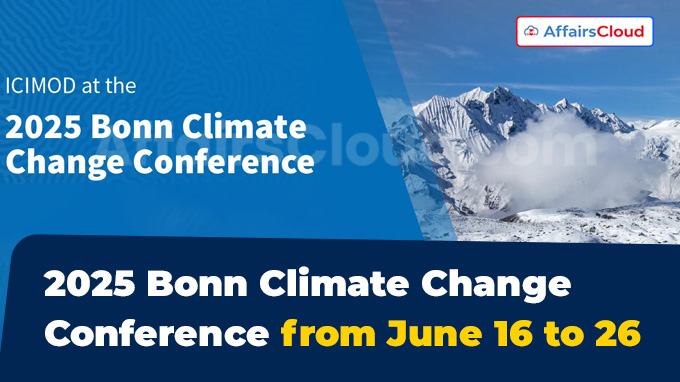 The 62nd Sessions of the Subsidiary Bodies of the United Nations Framework Convention on Climate Change (UNFCCC) i.e. (SB62) or also known as 2025 Bonn Climate Change Conference was held from June 16 to 26, 2025 at the World Conference Center Bonn (WCCB) in Bonn, Germany.
The 62nd Sessions of the Subsidiary Bodies of the United Nations Framework Convention on Climate Change (UNFCCC) i.e. (SB62) or also known as 2025 Bonn Climate Change Conference was held from June 16 to 26, 2025 at the World Conference Center Bonn (WCCB) in Bonn, Germany.
- This 11-day long conference brought together over 5,000 government delegates and stakeholders to discuss a wide range of issues such as the mobilization of finance to tackle climate change.
- During the conference, discussions were held on the Global Goal on Adaptation (GGA), aims to identify a common goal on adaption, just like limiting surface temperature below 1.5 degree celsius(°C), which is a global goal on mitigating GreenHouse Gas(GHG) emissions.
Note: GGA was part of the Paris Agreement (signed in 2015) but gained momentum only at Conference Parties (COP28) held in Dubai, the United Arab Emirates (UAE), where parties adopted a framework to define global goals on adaptation.
About 2025 Bonn Climate Change Conference:
i.The conference is formally known as the Sessions of the Subsidiary Bodies (SBs)of UNFCCC. It is a bi-annual meeting that takes place under the UNFCCC, an international agreement signed in 1992 to combat climate change.
ii.The conference is organised by two permanent SBs of UNFCCC: the Subsidiary Body for Implementation (SBI) and the Subsidiary Body for Scientific and Technological Advice (SBSTA).
- SBI guides UNFCCC governing bodies in the examination and review of the implementation of their decisions.
- While, SBSTA advises governing bodies on scientific knowledge related to climate change.
iii.It served as a key preparatory platform for 30th session of the Conference of the Parties to the UNFCCC(COP30), set to be held in Belém, Brazil, from November 10 to 21, 2025.
India Led Climate Finance Fight for Developing World:
At the SB62 Bonn Climate Conference, backed by robust interventions led by India, coalitions such as Group 77 (G-77), a coalition of 134 countries and China; the Like-Minded Developing Countries (LMDC), Alliance of Small Island States (AOSIS), Least Developed Countries (LDCs), and the African Group of Negotiators (AGN) unequivocally raised the issue of climate finance accountability.
- All these developing countries are demanding the inclusion of Article 9.1 of the Paris Agreement as a formal agenda item.
- The demand highlights ongoing frustration among developing nations over unfulfilled climate finance promises and the overdependence on debt-driven funding mechanisms.
Key Points:
i.India called for a clear plan to move from COP29’s USD300 billion goal to a much larger target of USD 1.3 trillion per year, as required under Article 9.1 of the Paris Agreement.
ii.India and Bolivia led the discussions during the formal consultation on Article 9.1, with active interventions from countries like: Nigeria, Chad, and the Arab Group.
- India made a forceful pitch for the inclusion of Article 9.1 as it described the article not just as a moral imperative, but a legal obligation and the ‘cornerstone of climate equity’.
- India emphasized that implementing Article 9.1 was essential to restoring credibility, balance, and trust in climate change.
About United Nations Framework Convention on Climate Change (UNFCCC):
Executive Secretary- Simon Stiell (Grenada)
Headquarters- Bonn, Germany
Founded- 1992




